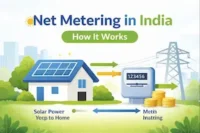Net Meter vs Gross Meter: A Simple Guide to Solar Billing Systems
Published: 26 Oct 2025
When you install a solar power system, one of the first things you will hear about is net metering and gross metering. These two systems decide how your solar energy is measured and how your electricity bill is calculated.
In simple words, net metering records the difference between the power your home uses and the power your solar panels send back to the grid. Gross metering, on the other hand, measures all the electricity your panels produce, even if you use some of it at home.
People often compare these two because they directly affect how much you save or earn from your solar setup. Choosing the right one can make a big difference in your energy costs and returns.
This article explains how both systems work, their main differences, their pros and cons, and which one fits best for your home or business.
Let’s see which one suits you better.

What is Net Meter
A net meter is a device that measures the difference between the electricity your solar panels produce and the amount you use from the grid. It helps balance your energy use and credits you for the extra power you send back. This setup suits homeowners who use solar energy during the day and want to reduce monthly bills.
What is a Gross Meter?
A gross meter records the total electricity your solar system generates, no matter how much you use yourself. All the produced power goes to the grid, and you buy the electricity you need separately. It works well for commercial users or those with large solar systems focused on steady income from feed-in tariffs.
Detailed Comparison Between Net Meter vs Gross Meter
Now, here is a detailed comparison of net meter vs. gross meter based on the following aspects:
- Pricing/Tariff Structure
- Billing Mechanism
- Revenue Generation / Savings
- Ownership Type
- Grid Dependency
- Energy Consumption Pattern
- Policy and Regulatory Approval
- System Size and Capacity
- Payback Period
- Maintenance and Monitoring
- Metering Type and Technology
- Energy Export and Import Policy
- Contract or Agreement Terms
- Government Incentives/Subsidies
- Applicability (Residential, Commercial, Industrial)
1. Pricing / Tariff Structure
When comparing their pricing systems, both metering types follow different billing approaches.
Net Meter:
- You pay only for the electricity you use after subtracting what your solar system sends to the grid.
- Any extra power exported earns credits that reduce your next bill.
Gross Meter:
- You sell all the solar power to the grid at a fixed feed-in tariff.
- You buy the electricity you use at standard retail rates.
Verdict:
If your goal is to reduce electricity bills, net metering is a more effective solution. For fixed income from energy sales, gross metering is more stable.
2. Billing Mechanism
Billing under both systems is handled differently.
Net Meter:
- The meter records both import (from the grid) and export (to the grid).
- The bill shows the difference, also called net energy use.
Gross Meter:
- The meter records only the total energy produced.
- You receive separate bills—one for the power you sell and one for the power you buy.
Verdict:
Net metering offers a simpler billing process, while gross metering gives clearer income tracking.
3. Revenue Generation / Savings
This aspect decides how much you earn or save through solar.
Net Meter:
- Savings come from lower electricity consumption from the grid.
- You earn credit for extra energy exported.
Gross Meter:
- Income comes from selling all generated power at a fixed rate.
- Savings depend on tariff value and contract terms.
Verdict:
Net metering helps reduce energy costs, while gross metering focuses on steady income.
4. Ownership Type
Different users benefit from each system based on ownership.
Net Meter:
- Ideal for self-owned residential systems.
- Supports users who want to manage their energy use.
Gross Meter:
- Common in large or shared systems, such as leased commercial setups.
- Works for investors who produce power for sale.
Verdict:
Net metering suits homeowners, while gross metering fits producers and investors.
5. Grid Dependency
Both rely on the grid but in different ways.
Net Meter:
- Uses the grid only when solar energy is insufficient.
- You can draw or send power anytime.
Gross Meter:
- Fully dependent on the grid for your energy needs.
- All produced power is exported.
Verdict:
For more independence, Net Metering is better; for full export systems, gross metering fits.
6. Energy Consumption Pattern
Your energy habits influence which system works better.
Net Meter:
- Best for daytime energy use when panels are active.
- Reduces grid reliance for homes with consistent usage.
Gross Meter:
- Works for users with low on-site consumption.
- Benefits those who produce excess power for sale.
Verdict:
If you use power mainly during the day, go for net metering; if not, gross metering suits you.
7. Policy and Regulatory Approval
Both systems depend on government or utility approval.
Net Meter:
- Requires local utility permission and net metering policy support.
- Rules may vary by region.
Gross Meter:
- Needs a power purchase agreement (PPA) or similar authorization.
- Often used under state or commercial energy contracts.
Verdict:
Approval for net metering is simpler for homes, while gross metering involves formal contracts.
8. System Size and Capacity
System size affects which metering type performs better.
Net Meter:
- Usually supports small to medium solar systems.
- Ideal for homes and small businesses.
Gross Meter:
- Preferred for large commercial or industrial systems.
- Handles high-capacity generation easily.
Verdict:
Net Metering suits smaller systems; Gross Metering benefits large-scale producers.
9. Payback Period
Payback time varies between both setups.
Net Meter:
- Quicker returns because savings start from reduced bills.
- Payback depends on self-consumption and tariff rate.
Gross Meter:
- Longer payback due to fixed-rate income.
- More predictable but slower savings.
Verdict:
If you want faster recovery, Net Metering is quicker; for long-term income, Gross Metering is steadier.
10. Maintenance and Monitoring
Both need maintenance, but at different levels.
Net Meter:
- Low maintenance and easy monitoring through standard billing.
- Performance can be tracked via utility apps.
Gross Meter:
- May need extra metering and inspection for production verification.
- Common in commercial setups with reporting needs.
Verdict:
Net Metering is simpler to maintain; Gross Metering demands closer supervision.
11. Metering Type and Technology
Metering setup differs in both systems.
Net Meter:
- Uses a bi-directional smart meter.
- Measures import and export accurately.
Gross Meter:
- Uses a generation-only meter.
- Measures only total production.
Verdict:
Net Metering offers more precise tracking for homes, while Gross Metering focuses on production data.
12. Energy Export and Import Policy
Energy flow is managed differently under each policy.
Net Meter:
- Allows both import and export of electricity.
- Unused energy gets credited for later use.
Gross Meter:
- Only export is allowed; import is billed separately.
- No offset for your own consumption.
Verdict:
Net Metering gives flexible energy use; Gross Metering gives fixed export control.
13. Contract or Agreement Terms
Both may involve different agreements.
Net Meter:
- Usually part of a consumer’s standard utility connection.
- No long-term binding contract.
Gross Meter:
- Requires a formal power purchase agreement (PPA).
- Terms define rate, duration, and power quantity.
Verdict:
Net Metering offers flexibility; Gross Metering ensures stable long-term deals.
14. Government Incentives / Subsidies
Policies and subsidies may differ for both systems.
Net Meter:
- Often supported under residential solar schemes.
- May include subsidies or rebates for installations.
Gross Meter:
- Commonly backed by industrial or utility-level programs.
- Incentives are linked to energy sale contracts.
Verdict:
Net Metering gains from household subsidies, while Gross Metering benefits from production-based incentives.
15. Applicability (Residential, Commercial, Industrial)
The right choice depends on usage type.
Net Meter:
- Best for residential and small commercial users.
- Focused on cutting energy bills.
Gross Meter:
- Ideal for commercial and industrial producers.
- Aimed at generating consistent income.
Verdict:
For homes, Net Metering is practical. For large setups, Gross Metering is more rewarding.
Final Note:
Both systems help manage solar energy efficiently. The right choice depends on your energy needs, system size, and financial goals.
Pros and Cons of Net Meter and Gross Meter
Understanding both sides of each system helps you decide which one fits your solar goals. Here’s a clear look at the Net Meter and Gross Meter, focusing on how they perform in daily use and long-term value.
Pros of Net Metering
Net Metering gives homeowners a fair way to save money and use solar power efficiently. It’s designed to make the most of your own energy while staying connected to the grid.
- Cuts monthly electricity costs.
- Rewards you for using self-generated solar power.
- Simple and easy to understand for new users.
- Works smoothly with smart meters and solar apps.
- Offers quick savings after setup.
- Needs little effort to manage once installed.
- Perfect for homes with daytime energy use.
Cons of Net Metering
While Net Metering is great for savings, it can have a few limits depending on your local policy and energy use.
- Savings vary with your power consumption.
- Some regions limit export credits.
- Policies differ between utility companies.
- It may not suit very large solar systems.
- Upgrading to a bi-directional meter can cost extra.
Benefits of Gross Meter
Gross Metering focuses on steady income rather than savings. It’s ideal for users who produce more power than they consume or run large solar setups.
- Provides a fixed income from solar production.
- Keeps billing and production separate for easy tracking.
- Works well for commercial and industrial systems.
- Ensures predictable returns through feed-in tariffs.
- Suitable for investors selling all generated power.
Cons of Gross Metering
Though it’s reliable for income, Gross Metering may not favor users who rely on self-use of solar energy.
- You still pay for the power you use from the grid.
- Lower returns for small homes or low usage.
- Fully dependent on grid availability.
- Income stays limited to fixed tariff rates.
- Takes longer to recover installation costs.
Which One Should You Choose?
Choosing between Net Metering and Gross Metering depends on your energy goals and how you use power.
When Net Metering is Better:
Net Metering is ideal for homeowners who want to reduce their electricity bills. It lets you use the solar power you produce during the day and send the extra energy back to the grid. This setup helps balance your usage and gives you credit for what you export. It’s great for small to medium homes where saving on monthly bills is the main goal.
When Gross Metering is Better:
Gross Metering works best for commercial setups or large solar systems that generate high amounts of power. Instead of using your solar electricity directly, you sell all of it to the grid at a fixed rate. It’s perfect for businesses, industries, or investors looking for a steady and predictable income from their solar energy production.
Decision Tip:
If your goal is to save on electricity bills, go for Net Metering.
If you want a guaranteed income from solar production, Gross Metering is the smarter pick.
Conclusion
Both Net Meter and Gross Meter measure solar energy, but they work in different ways. Net Metering helps you use your own solar power first and cuts down your electricity bill. Gross Metering sends all your solar energy to the grid, giving you a steady payment for what you produce.
Each system has its own method for billing, saving, and earning from solar power. The right choice depends on how you use energy and what you expect from your solar setup.
Now that you know the key differences between net meter and gross meter, choose the one that fits your goals best.

- Be Respectful
- Stay Relevant
- Stay Positive
- True Feedback
- Encourage Discussion
- Avoid Spamming
- No Fake News
- Don't Copy-Paste
- No Personal Attacks



- Be Respectful
- Stay Relevant
- Stay Positive
- True Feedback
- Encourage Discussion
- Avoid Spamming
- No Fake News
- Don't Copy-Paste
- No Personal Attacks




